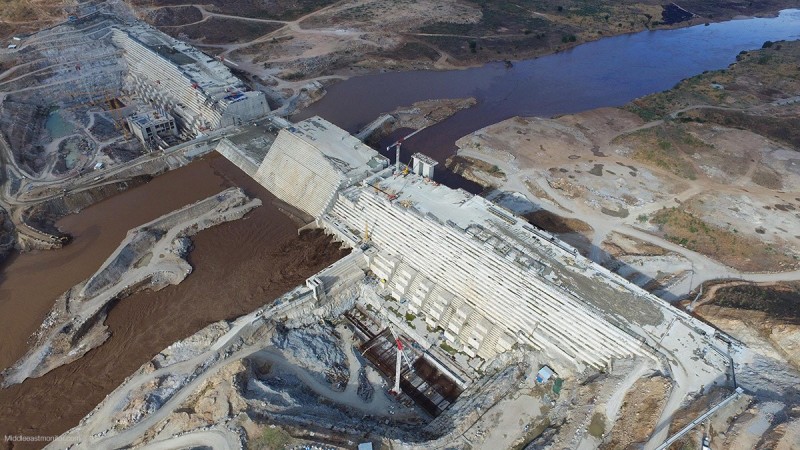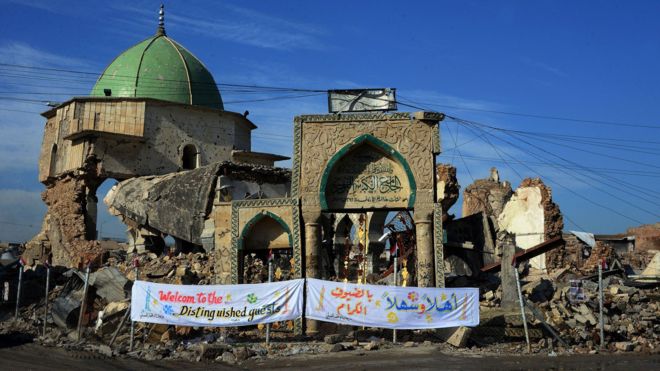As negotiations between Egypt, Sudan, and Ethiopia over the latter’s controversial Nile River Dam reached a deadlock, bellicose rhetoric again took center stage and water diplomacy might escalate into direct confrontation.
While this is merely an impending logistical scenario for some, for others the current crisis is an indication that Egypt is losing much of its former diplomatic leverage. They see Egypt helplessly witnessing Ethiopia threatening its water security without being able to successfully intervene.
Beating the Drums of War
Headlines of online media outlets and television channels abound with war lexicon to describe the current stalemate surrounding the Grand Ethiopian Renaissance Dam (GERD). These headlines give the impression that countries of the Nile Basin, Egypt and Ethiopia in particular, are heading towards an inevitable armed confrontation, a matter of when and not if conflict is going to happen.
“Will the War Take Place?” reads a title published by French magazine Courrier International. “Ethiopia Says a Border War with Sudan is Unlikely,” reads a headline on the Arabic-language news website Sudan Tribune.
“Filling the Renaissance Dam is a Declaration of War on Egypt” says another headline, published on Al Hurra.
While some observers downplayed the likelihood of an armed confrontation because going to war is not in the interest of any party involved, others feel such an ominous prediction should not be excluded.
“These are the germs of instability, and it will cause a water war… If not under this government then under another,” said Ahmed Al Mufti, a former Sudanese party to negotiations with Egypt and Ethiopia to resolve contentions over water issues.
Al Mufti told the Guardian that every day he sees “more evidence” that backs his bleak assessment, warning of the danger the dam poses to his fellow countrymen who will see their share of Nile River water decrease over the coming years.
‘All Options on the Table’
While Al Mufti seemed to state an inevitable outcome based on observations on the ground, Egyptian observers were more explicit. Many warned Addis Ababa of retaliation in the event it pursues its plans to start filling the dam during the rainy season in July.
Going ahead with these plans would constitute, according to Aymen Shabana of Cairo University, a “declaration of war on Egypt.”
“In this case, all options are going to be on the table, from peaceful alternatives to more coercive ones,” the Director of the Institute of African Research and Studies told Al Hurra.
Using even stronger war rhetoric, Naguib Sawiris, one of Egypt’s most prominent businessmen, tweeted: “If Ethiopia doesn’t come to reason, we the Egyptian people will be the first to call for war.”
The Good, the Bad, and the Ugly
Ethiopia’s decision to move ahead with building the dam, while Egypt was preoccupied with the 2011 uprising and 2013 ousting of former President Mohamed Morsi, gradually helped it dictate a fait-accompli on Cairo and Khartoum as negotiations failed to gain a breakthrough.
The situation at times seems reminiscent of the iconic scene of Sergio Leone’s masterpiece film “The Good, the Bad and the Ugly,” where each of the three main characters, with his hand ready to grab his gun, considers which of the other two he should shoot first.
In the beginning of negotiations regarding the dam, Sudan seemed to side with Egypt. Both entered talks with Ethiopia over the effects the dam will have on their respective shares of the Nile water. Khartoum later on appeared to reverse course on the basis that the dam will benefit Sudan, providing much-needed electricity at a cheaper price, as well protection against floods.
Sudan’s refusal in March to endorse an Arab League resolution supporting Egypt in the dispute with Ethiopia sounded alarms for Cairo.
Tension erupted between Khartoum and Addis Ababa after May 29 clashes between Sudanese soldiers and an independent Ethiopian militia in the Sudanese province of al-Qadrif. A Sudanese officer was killed and six other soldiers were injured during the attack.
The Sudanese army described the attack as “hostile and criminal acts,” accusing the Ethiopian military of providing support for the militia. The Sudanese army also stated that participating in negotiations to achieve an agreement is necessary before deeming war is the only option left.
Power Shift
As many in academia and resource diplomacy believe future conflicts between states will increasingly center on natural resources such as water, the countries which control such resources will yield immense power.
For some, the current Nile water crisis is already signaling a power shift in the region, with Egypt no longer the influential country it used to be.
For decades Egypt claimed a right of 55.5 billion cubic meters of the Nile water based on a treaty signed with Britain in 1929 and a bilateral agreement with Sudan in 1959. In addition to these treaties, Egypt’s military and diplomatic superiority deterred Ethiopia from building the long-planned dam. This occurred despite grievances from Addis Ababa that the Blue Nile originates from Ethiopian Lake Tana, and that such a project is vital to generate economic benefits and ensure access to electricity for most Ethiopians.
Now Ethiopian officials are running the show, while Egypt’s leverage seems to be something of the past. The dam is a huge undertaking through which Ethiopia seeks to project its ambition to become a regional and continental power. The $4.5 billion project is expected to contain 70 billion cubic meters of water.
Despite early war threats from former President Mohamed Morsi and Egyptian politicians and society, Ethiopia pursued the construction of the dam. Addis Ababa responded to war threats coming from Egypt with an equally strong language when Prime Minister Abiy Ahmed said in 2019 his fellow countrymen will take up arms if necessary to protect the dam.
“Some say things about use of force (by Egypt). It should be underlined that no force could stop Ethiopia from building a dam…If there is a need to go to war, we could get millions readied,” he warned.
Between a Rock and a Hard Place
In addition to Ethiopia’s growing sense of power, some foreign observers claim that Cairo showed weaknesses throughout the crisis. Many Egyptians also seem to share this belief.
“We’ve lost. We were unable to stop them from building the dam; we couldn’t get them to change any part of their plans, especially to reduce its capacity,” said an Egyptian official who spoke on the condition of anonymity as quoted by Orient XXI.
As time goes by the Egyptian position grows even weaker. Today, Cairo seems caught between a rock and a hard place.
While war is a devastating option and might not be the solution, Egypt may find itself at Ethiopia’s mercy when it comes to something as vital as water security.
Cairo also runs the risk of alienating millions of Egyptians who accuse their government of failing to protect their livelihoods as they see their share of water decrease day after day.





